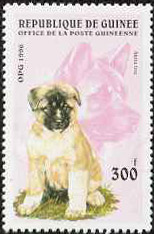
Basenji Out of Africa (The Pure-breed Series)
Basenjis are a very old breed, used as a hunting dog in Africa. They are sometimes classed as hounds, but they have a number of special characteristics that make them stand out. They don't bark, but they do have special Basenji noises when they are happy, and when they are sad and lonely, so they can annoy the neighbours when you leave them alone. In fact they can annoy neighbours more than most dogs, because the sound they make doesn't appear to have come from a dog, rather from a very unhappy human!
They can also be good watchdogs, alerting their owners to strangers at the door. Basenjis are sometimes wary of strangers, and need ongoing socialization. They like to chase cats and other small animals, because they are hunting dogs, so can't always be trusted off the lead, and they can escape from gardens despite fences that would deter most dogs of their size. They can get on very well with older children, especially if the Basenjis have grown up knowing children from when they were puppies, and the children manage to understand the Basenji's mind, but Basenjis can be a bit too pushy and lively for families with younger children. It's a good idea to bring children into the training programme, so that these dogs have consistency in how house rules are applied to them, and so they learn to respect the children.
Dog aggression can be a problem with Basenjis, especially against other dogs of the same sex though they often get on well with other Basenjis in a household, and can get on well with some breeds. Basenjis are also notorious chewers, a trait which can persist into adulthood, so you may need to dog-proof your home more than usual, and confine your Basenji to parts that you don't mind being chewed. Behavioural problems have often been reported in Basenjis, and this may be because they look deceptive. They are elegant, small to medium dogs, it is difficult to believe there is so much willpower packed in such a small body.
Training Basenjis is similar to training spitz dogs; Basenjis are not dumb, they just don't always want to do what you want them to, and they need firm ground rules from when they are pups, because they can be so pushy. This should go beyond the usual bite inhibition - Basenjis are very good at getting their own way, and if you give in too easily, they are bright little dogs and will take advantage of this. They also need active lives, or they can get bored and chew, or otherwise annoy their owners. Providing lots of chew toys, and Kongs smeared with peanut butter can help.
Generally, these are active, healthy dogs, but they do have common health problems which include Fanconi syndrome, anaemia, eye trouble, digestive problems, and hypothyroidism.
Why get a Basenji with all these problems? There is a magic about this breed. They are intelligent, active and alert dogs, which are exceptionally good looking. They are also very clean dogs. They are easy to housetrain and tend not to shed or smell much, though their coats are thin, so they do need protection in winter, and they tend not to want to spend long outside when it's wet and cold. They are quite small, so don't take up much space or eat you out of house and home. Basenji bitches also have just one season a year, whereas most dogs have two. If you choose your pup carefully, ignoring the most pushy one - unless you like especially strong-willed dogs - you can have a delightful companion which is unique in the dog world.
New Basenji stock has been imported from Africa to the US, and this book examines the influence of these imports, as well as telling you a lot about the breed. Basenjis are truly unique, and originated in just one small area in Africa. The book gives you a thorough history of the breed, as well as a clear description of its unique characteristics, with explanations of why they have developed, and why Basenjis are different. The book is both well-researched and a pleasure to read. It's of interest to people who study canine evolution, as well as the breed's many fans.



